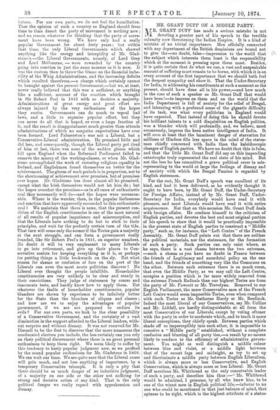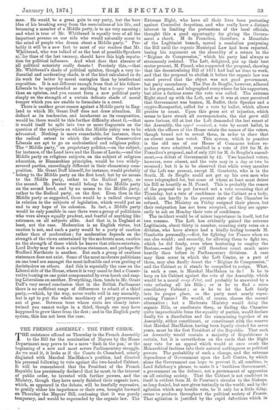MR. GRANT DUFF ON A MIDDLE PARTY.
Are.dGevRoting apgreater hpasartmof ehias seriouspeeocuhs to mistake the tiearrinbolet calamity now threatening the Indian Empire. It is a kind of mistake of no trivial importance. Men officially connected with any department of the British dominions are bound not to give the—no doubt, false—impression to the world that 17. the subject which interests them least is the responsibility which at the moment is pressing upon them most. Besides, it is quite certain that do what we can, a vast and unspeakable amount of suffering must remain to be borne, with which it is on every account of the first importance that we should both feel the deepest sympathy and show it. That the Under-Secretary for India, in addressing his constituents at such a moment as the present, should have done all in his power,—and how much in the case of such a speaker as Mr. Grant Duff that would have been !—to impress on them and on the world that the India Department is full of anxiety for the relief of Bengal, and labouring with a profound sense of the gigantic difficulty of its task, was what every politician in England would have expected. That instead of doing this he should devote his brilliant talents to a cold disquisition on English politics, was a blunder which will profoundly, and, we believe, most erroneously, impress the keen native intelligence of India. It will seem at least that the imminent danger of starvation for millions of Hindoos fills less space in the mind of the states- man chiefly concerned with India than the kaleidoscopic changes of English parties. We have no doubt that this is false, and that the little Mr. Grant Duff did say on this impending catastrophe truly represented the real state of his mind. But not the less he has committed a grave political error in mis- representing to the world at large the feelings of dismay and of anxiety with which the Bengal Famine is regarded by English statesmen.
For the rest, Mr. Grant Duff's speech was excellent . of its kind, and had it been delivered, as he evidently thought it ought to have been, by Mr. Grant Duff, the Under-Secretary for Foreign Affairs, instead of by Mr. Grant Duff, Under- Secretary for India, everybody would have read it with pleasure, and most Liberals would have read it with entire acquiescence. Not that on this occasion Mr. Grant Duff deals with foreign affairs. He confines himself to the criticism of English parties, and devotes the best and most original portion of his speech to show that it would be practically impossible in the present state of English parties to construct a "Middle party,' such as, for instance, the "Left Centre" of the French Assembly. Mr. Grant Duff points out that there are neither the political materials, nor the statesmen, for the formation of such a party. Such parties can only exist where, as he says, there is a vast chasm between the two extremes, —such a chasm as you have no doubt in France between the friends of Legitimacy and sacerdotal policy on the one hand, and the friends of something very like the Commune on the other. Between such extremes there is so much room, that even the Middle Party, as we may call the Left Centre, occupies a position which is far more widely removed from the extreme French Radicals than our highest Tories are from the party of Mr. Fawcett or Mr. Trevelyan. Removed to our English Parliament, the more Conservative men of the French Left Centre would seem impossible Tories, even when compared with such Tories as Mr. Gathorne Hardy or Mr. Bentinck. Indeed the most liberal of our Conservatives, say Mr. Collins and Mr. Liddell, are hardly distinguishable at all from the most Conservative of our Liberals, except by voting oftener with the party in order to moderate which, and to teach it more liberal conceptions, they chiefly speak. Between parties which shade off so imperceptibly into each other, it is impossible to conceive a "Middle party" established, without a complete confusion and blurring of all party ties,—a result by no means likely to conduce to the efficiency of administrative. govern- ment. You might as well distinguish a middle colour between blue and violet, or a middle light between that of the recent fogs and midnight, as try to set up and discriminate a middle party between English Liberalism, which is always more or less Conservative, and English Conservatism, which is always more or less Liberal. Mr. Grant , Duff mentions Mr. Whitbread as the only conceivable leader I of such a party, and describes him thus :—" Mr. Whitbread would be admitted, I presume, by all who know him, to be one of the wisest men in English political life,—inferior to no 1 one who could be mentioned in that just balance of mind, that aptness to be right, which is the highest attribute of a states- man. He would be a great gain to any party, but the bare idea of his breaking away from the associations of his life, and becoming a member of a Middle party, is to me very amusing ; and what is true of Mr. Whitbread is equally true of all the important persons on our side who would naturally occur to the mind of people who dream about a Middle party." Pro- bably it will be a new fact to most of our readers that Mr. Whitbread, who was talked of as the best of possible Speakers acthe time of the last vacancy, should have this high reputa- tion for political influence. And what does that absence of all political notoriety really denote ? Precisely this,—that Mr. Whitbread's shade of political opinion, though a very in- fluential and moderating shade, is of the kind calculated to do its work far better by moral contagion than by intellectual exposition. It is not different enough from that of his fellow- Liberals to be apprehended as anything but a temper rather than an opinion, and you cannot form a new political party simply on the strength of a certain delicate shade of moral temper which you are unable to formulate in a creed.
There is another great reason against a Middle party in Eng- land to which Mr. Grant Duff does not draw attention. Ill defined as its tendencies, and incoherent as its composition, would be, there would be this further difficulty about it,—that it would itself be split into two or more fragments on the question of the subjects on which the Middle policy was to be advocated. Nothing is more remarkable, for instance, than the radical extent to which the otherwise Conservative Liberals are apt to go on ecclesiastical and religious policy. The "Middle party," on proprietary politics,—on the subject, for instance, of the Land laws and the House of Lords,—and the Middle party on religious subjects, on the subject of religious education, or Bismarckian principles, would be two widely- severed parties, exceedingly different in their elementary com- position. Mr. Grant Duff himself, for instance, would probably belong to the Middle party on the first head, but by no means to the Middle party, rather to the Radical party, on the second. Mr. Forster would belong to the Middle party on the second head, and by no means to the Middle party, rather to the Radical party, on the first. Even then in the Middle party as suggested, there would be a radical cleavage in relation to the subjects of legislation, which would put an end to any hope of its cohesion. In fact, a Middle party would be only possible in case there were a group of politicians who were always equally prudent, and fearful of anything like extremes, on all subjects alike. And that is, in England at least, not the case. Moderation is an English virtue, but caution is not, and such a party would be a party of caution rather than of moderation ; for moderation depends on the strength of the views entertained by the moderate man, caution on the strength of those which he knows that others entertain. Lord Derby may be such a cautious statesman, and perhaps Sir Stafford Northcote is another. But such a group of cautious statesmen does not exist. Some of the most moderate politicians on one head are amongst the most inflexible and even grating of doctrinaires on others. And this is especially the case on the Liberal side of the House, where it is very usual to find a Conser- vative leaning on one point compensated by even harsh and rasp- ing Liberalism on another. Everything, then, tends to Mr. Grant Duff's very sound conclusion that in the British Parliament there is no sufficient range of differences to admit of a third party,—which, by the way, never works well in any assembly, but is apt to put the whole machinery of party government out of gear. Between trees whose roots are closely inter- twined you cannot wedge in a third, though one may have happened to grow there from the first ; and in the English party system, this has not been the case.



































 Previous page
Previous page